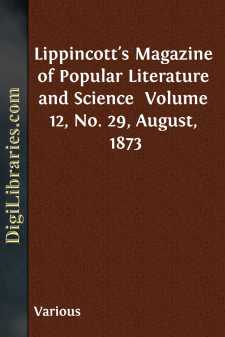Categories
- Antiques & Collectibles 13
- Architecture 36
- Art 48
- Bibles 22
- Biography & Autobiography 813
- Body, Mind & Spirit 142
- Business & Economics 28
- Children's Books 15
- Children's Fiction 12
- Computers 4
- Cooking 94
- Crafts & Hobbies 4
- Drama 346
- Education 46
- Family & Relationships 57
- Fiction 11828
- Games 19
- Gardening 17
- Health & Fitness 34
- History 1377
- House & Home 1
- Humor 147
- Juvenile Fiction 1873
- Juvenile Nonfiction 202
- Language Arts & Disciplines 88
- Law 16
- Literary Collections 686
- Literary Criticism 179
- Mathematics 13
- Medical 41
- Music 40
- Nature 179
- Non-Classifiable 1768
- Performing Arts 7
- Periodicals 1453
- Philosophy 64
- Photography 2
- Poetry 896
- Political Science 203
- Psychology 42
- Reference 154
- Religion 513
- Science 126
- Self-Help 84
- Social Science 81
- Sports & Recreation 34
- Study Aids 3
- Technology & Engineering 59
- Transportation 23
- Travel 463
- True Crime 29
Lippincott's Magazine of Popular Literature and Science Volume 12, No. 29, August, 1873
by: Various
Description:
Excerpt
THE NEW HYPERION.
FROM PARIS TO MARLY BY WAY OF THE RHINE.
THE FLOWERS OF WAR."Thou art no less a man because thou wearest no hauberk nor mail sark, and goest not on horseback after foolish adventures."
So I said, reassuring myself, thirty years ago, when, as Paul Flemming the Blond, I was meditating the courageous change of cutting off my soap-locks, burning my edition of Bulwer and giving my satin stocks to my shoemaker: I mean, when I was growing up—or, in the more beauteous language of that day, when Flemming was passing into the age of bronze, and the flowers of Paradise were turning to a sword in his hands.
Well, I say it again, and I say it with boldness, you can wear a tin botany-box as bravely as a hauberk, and foolish adventures can be pursued equally well on foot.
Stout, grizzled and short winded, I am just as nimble as ever in the pretty exercise of running down an illusion. Yet I must confess, as I passed the abattoirs of La Villette, whence blue-smocked butcher-boys were hauling loads of dirty sheepskins, I could not but compare myself to the honest man mentioned in one of Sardou's comedies: "The good soul escaped out of a novel of Paul de Kock's, lost in the throng on the Boulevard Malesherbes, and asking the way to the woods of Romainville."
THE INVADERS OF ROMIAINVILLE.Romainville! And hereabouts its tufts of chestnuts should be, or were wont to be of old. I am in the grimy quarter of Belleville. Scene of factories, of steam-works and tall bleak mansions as it is to-day, Belleville was once a jolly country village, separated on its hilltop from Paris, which basked at its feet like a city millionaire sprawling before the check apron and leather shoes of a rustic beauty. Inhabited by its little circle of a few thousand souls, it looked around itself on its eminence, seeing the vast diorama of the city on one side, and on the other the Près-Saint-Gervais, and the woods of Romainville waving off to the horizon their diminishing crests of green. A jolly old tavern, the Ile d'Amour, hung out its colored lamps among the trees, and the orchestra sounded, and the feet of gay young lovers, who now are skeletons, beat the floor. The street was a bower of lilacs, and opposite the Ile d'Amour was the village church.
Then the workmen of the Paris suburbs were invaders: they besieged the village on Sundays in daring swarms, to be beaten back successfully by the duties of every successive Monday. Now they are fixed there. They are the colorless inhabitants of these many-storied houses. The town's long holiday is over. Where the odorous avenues of lilacs stretched along, affording bouquets for maman and the children and toothpicks for ferocious young warriors from the garrisons, are odious lengths of wall. Everything is changed, and from the gardens the grisettes of Alfred de Musset are with sighing sent. Their haunts are laboratories now, and the Ile d'Amour is a mayor's office.
I, to whom the beer-scandals of the Rhine and the students' holidays of the Seine were among the Childe-Harold enormities of a not over-sinful youth, was sadly disappointed....












